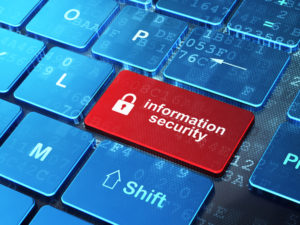4 Ways to Reduce Your Security Risks Online

Not that long ago, one of the main threats to a credit union or bank was being robbed by armed gunmen demanding to get into the vault, but in the past five years or so, new threats of money-stealing activities have become more commonplace. Sure, the bank robbers of old could still make their mark, but intelligent hackers have found a way to get a lot more than money in a vault,they have ways of getting everyone’s total online profile–including all of their bank accounts. The end result is the same, but the methods have changed.
That’s why you have to be so vigilant about how secure you are with your online bank accounts, so you won’t end up in the above scenario. Lucky for you, we have four tips that will help you stay on top of your online security.
Public Wifi Woes
Wi-fi can be found almost anywhere these days. From the local coffee shop to Target and other big box retailers, you can get online anywhere. This is great if all you are going to do is read some articles online or casually browse the internet. However, never do any kind of online banking, bill paying, or other monetary transactions over a public wi-fi network. Oftentimes these networks aren’t very secure, which makes a perfect and easy playground for hackers. So, just say no to public wi-fi when it comes to money online.
Keep a Watch on Emails
Emails can be the bait in a grand hacking scheme. That’s why luring people into a scam by sending emails is called “phishing”. If you get a suspicious email that says you won an all expense paid vacation to Tahiti, and you know you never entered a contest for a trip, then it’s a scam. Whatever you do, do not even click those emails open to check it out. Once you open those emails and click on their links, they can download all your information off of your computer, track your keystrokes to get passwords, and all other kinds of horrible acts. When they have all of that information, your bank accounts are compromised along with your entire identity. So suspicious or “too good to be true” emails are out–just don’t do it!
Use Anti-Virus Software
To keep the online security threats at bay, make sure you have a good anti-virus software program on your computers and mobile devices. Keep them updated regularly for the best security. If your devices aren’t protected, you are a prime target for hackers to get your information.
Change Your Password Regularly
One of the easiest actions you can take to keep yourself more secure online is to regularly change your passwords. Changing up your passwords on your bank accounts every once in awhile will keep a hacker guessing. If you can’t remember to change it, set a reminder every other month or so, and it will prompt you to change them. Of course, make sure you use a password that no one could easily guess, and never use the same exact password for multiple accounts.
So being secure doesn’t have to be hard, it just takes a little common sense. Keep these principles in mind next time you worry about your online security.
« Return to "Blog"
